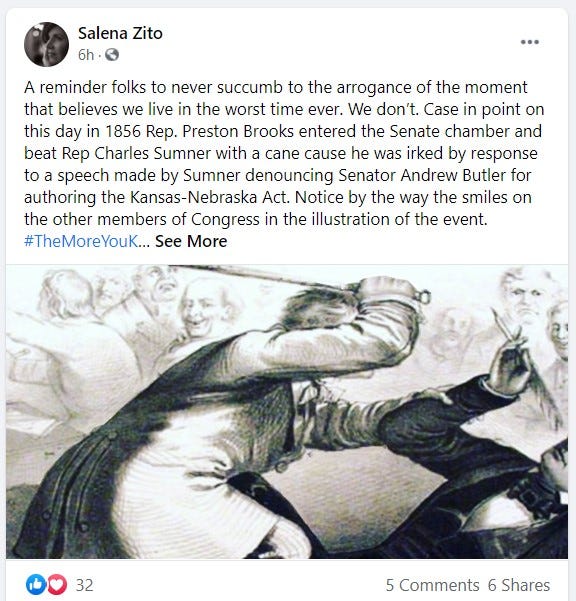Ricochet is the best place on the internet to discuss the issues of the day, either through commenting on posts or writing your own for our active and dynamic community in a fully moderated environment. In addition, the Ricochet Audio Network offers over 50 original podcasts with new episodes released every day.
 Think Things Are Contentious Now? Learn Some History
Think Things Are Contentious Now? Learn Some History
There is a never-ending contest for “favorite journalist” in the Johnston household, but Salena Zito is always a finalist. And she just rocketed into the pole position.
I’m delighted to be a “friend” of hers on Facebook. I rarely take issue with her reporting. She fills a niche long ignored by corporate media – focusing on real people and real communities that fall between the Hudson River (NY) and LAX. More specifically, lives and communities that border or encompass Greater Appalachia, from western Pennsylvania and eastern Ohio to West Virginia and southern Virginia. She stays outside Washington’s beltway and she refuses to traverse interstate highways.

This post echoes the very point I’ve made previously as an amateur US Senate historian (I am a former Secretary of the Senate and was responsible for the Senate’s legendary historical office). If you think things are contentious now, go back a few years. Or decades. Even a century or two. While partisanship may be at an all-time high in an evenly divided House and Senate, no one is pulling out fireplace tongs, knives, or guns or setting off bombs (well, so far).
The 1856 speech that drove Rep. Preston Brooks (D-SC) to enter what is now the Old Senate Chamber (the Senate moved into their “new” digs in 1860) was the famous “Crimes Against Kansas” speech by Massachusetts’ Charles Sumner (Whig, later “Radical Republican”). In that speech, Sumner, strongly opposed to slavery, personally attacked his colleague, Sen. Andrew Butler (D-SC), a “states rights” (pro-slavery) advocate. Brooks, Butler’s cousin, felt obliged to defend the family honor on May 19, 1856, by bludgeoning and permanently injuring Sumner with a gold-tipped cane. Then, as now, the Senate afforded floor access to House members, which is not reciprocal.
Temperatures were reaching a boiling point that year following the passage of the Kansas-Nebraska Act. It was a controversial bill authored by future Presidential candidate Stephen Douglas (D-IL). It let Kansas and Nebraska decide, as newly-admitted states, whether they would allow or outlaw slavery. While Nebraska had no difficulty choosing to become a “free” state, the result was a bloody nightmare in Kansas that spilled over to neighboring states and territories. Kansas would later be admitted as a “free state” after the southern states (and their senators) succeeded.
And the Kansas-Nebraska Act would have a much more significant, longer-term impact on America and its history, then and now. This, from History.com:
Opposition to the Kansas-Nebraska Act inspired the formation of the Republican Party, which became the nation’s leading antislavery political party. It also drew Abraham Lincoln, a former one-term congressman from Illinois, back into the political arena. By 1858, Lincoln’s eloquent argument against slavery’s extension would go on display in a now-famous series of debates with Douglas, as Lincoln unsuccessfully challenged the “Little Giant” for his Senate seat.
Lincoln’s victory in the 1860 presidential election marked a decisive defeat not just for Douglas—who ran as the northern representative of the divided Democrats—but for his belief that popular sovereignty could prevent national politics from dissolving into a regional conflict over slavery. In fact, the Kansas-Nebraska Act served to further divide the nation, and served as a crucial step along the path to the Civil War.
Family lore (Elizabeth Warren, call your office) has it that an Arkansas ancestor of mine had his feet burned off in a fireplace when caught by the “Missouri Raiders” selling horses to “both sides” of the issue. Thus were the times. Thus far, Black Lives Matter and Antifa activists have not descended to THAT level of violence, but stay tuned.
Lots worse has happened in the Capitol than the incursion of January 6th. Yes, for the record, that was reprehensible. For instance, the 1983 bomb one November night just off the Senate chamber, or the 1954 firing of shots on the House chamber, during a roll call vote by Puerto Rican nationalists.
Side note: President Bill Clinton pardoned one of the 1983 Senate bombing convicts and provided clemency to 11 Puerto Rican terrorists who shot up the House chamber. Not counting on any of the January 6th Capitol incursion crowd to get similar treatment from the Biden regency. Actually, thus far, they’ve experienced third-world imprisonment.
Even in 1889, a Louisville Courier reporter named Charles Kincaid opened fire on a former congressman-turned-lobbyist he’d written about (being found “in the embrace of a woman not his wife”) a few years later. Former Rep. William Taulby’s (D-KY) blood stains are still evident on the marble stairs leading from the House chamber to the Capitol’s first floor. In fairness, Taulby had been threatening the slight Kincaid since his reporting, and the reporter chose to arm himself. He was never charged for killing Taulby.

I even remember watching House proceedings one day from my Russell Senate office when then-Rep. Robert K. Dornan (R-CA), in 1994, outed his GOP colleague, Rep. Steve Gunderson (R-WI), for being gay, in comments made from the well of the House. He made reference to Gunderson’s closet having a “revolving door.” Dornan had violated House rules and withdrew his remarks. And dare I quote Rep. Joe Wilson’s (R-SC) blurted two-word response to a statement during Barack Obama’s first State of the Union Addresses, barely more than 10 years ago?
This is our politics. This is America. Trump derangement syndrome and its corollary are real. People have divided over their views and votes for or against the former president, even now as he’s no longer in office. Such divisions have always existed. Meanwhile, our awful media (social and corporate) makes everything political. Still, things are never as bad as they seem. Or, were.
And life goes on, unfair as it may be. There are always people and causes working to divide us, internally and from abroad. The latest example is the new racism embodied in “Critical Race Theory.” It looks a lot like the old racism. And don’t get me started on “cancel culture,” or about the disparate treatment of violent BLM and Antifa actors compared to the largely unarmed gang that found their way into the US Capitol last January.
Social media is no indicator of true public opinion. It would be nice if people spent a little more time on our nation’s history. Not as some wish it was (see: the turgid, and demonstrably fraudulent 1619 Project), but as it actually was.
Our real war today is over the interpretation – or rewriting – of our history. We should always preserve, protect, and defend objective truth.
Published in General



Yes, things have been more contentious in the past. No congressman today would have the cajones to cane one of his colleagues. But it’s a mistake to think that contentiousness itself is the problem.
What is new — and more worrying than mere polarization — is the civilization-wide breakdown of the old moral order. The Yankees and Confederates may have despised each other, but, in the end, they occupied the same social universe. They prayed to the same god. They had families (unlike us), and they raised them in much the same way. They existed within (mostly) functional communities. And they had no Internet.
We, on the other hand, are governed by an unholy alliance of infants, sociopaths, and fantasists. Elite institutions regularly deny and subvert reality. A critical mass of the population is clamoring for “liberation” from imagined “oppressions.” Mental illness is ubiquitous. Social dysfunction is the norm. This is all new, and nothing good can come of it.